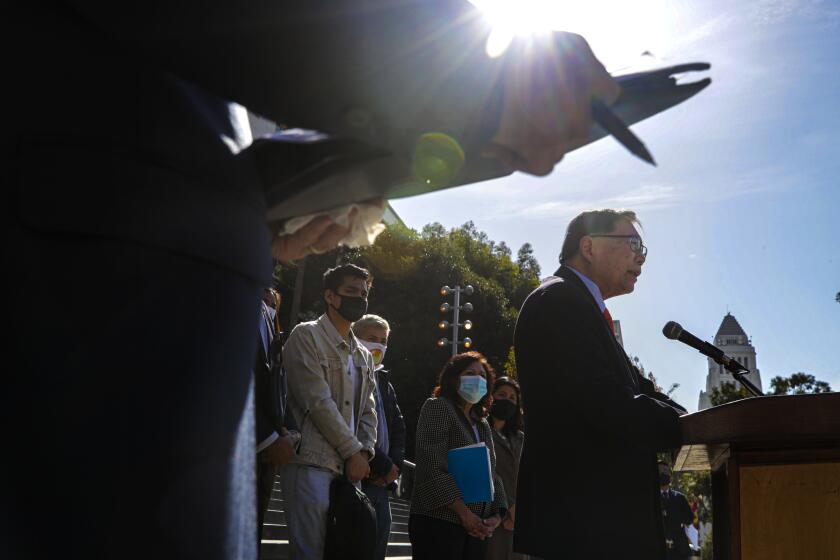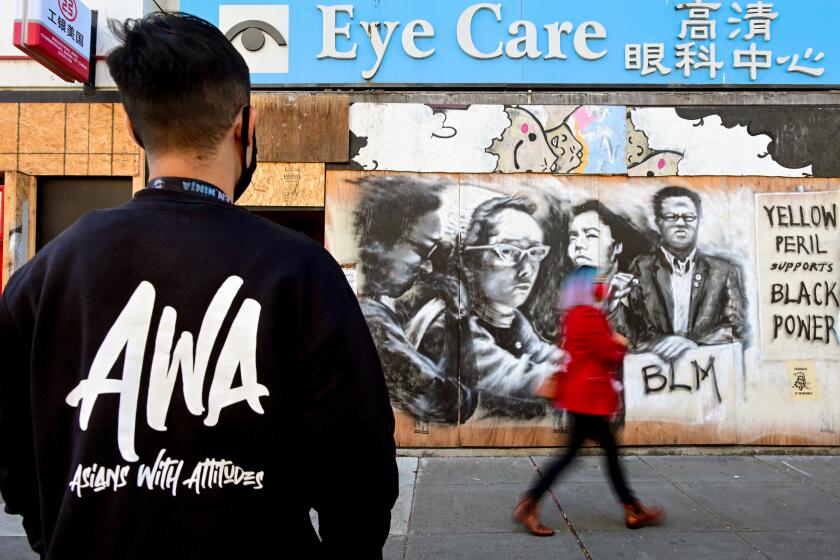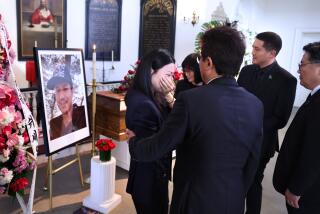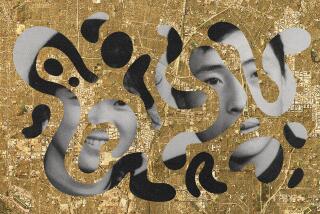Seal Beach police investigating racist letter sent to Korean American widow
- Share via
After running a restaurant in Indiana for 20 years, Byong Choi and his wife retired to Leisure World in Seal Beach.
They enjoyed the community’s golf course, gyms, movie nights and field trips.
As immigrants from South Korea, they never experienced racism at Leisure World — until after Byong Choi’s recent death.
A letter addressed to Choi’s widow arrived in the mail on Monday.
“Now that Byong is gone makes it one less Asian to put up with in Leisure World,” said the letter, written in cursive on yellow notebook paper. “You frickin Asians are taking over our American community!”
The Chois’ daughter, Sue Choi, opened the letter. She never gave it to her mother, to spare the 82-year-old woman the knowledge that someone, likely a neighbor, despised her for being Asian.
On the heels of her husband’s death, it would have been too much to bear.
“I’m not sad. No, I’m angry and I want to talk about it,” said Claudia Choi, 46, another of the Chois’ four daughters. “I want to tell people that this is happening because I think that people just assume that this doesn’t happen in real life.”
The racist letter to a grieving widow came days after a gunman killed eight people, including six Asian women, at Atlanta-area spas.
It came during a coronavirus pandemic when Asian Americans have increasingly become targets of verbal and physical attacks, with some people blaming them for the virus because it first emerged in China.
Many Asian Americans are bristling with pain and fury, seeing the Atlanta killings as a culmination of a steady drumbeat of racist attacks.
Seal Beach police are investigating the letter as a possible hate crime and are trying to determine who sent it.
The letter, which was mailed from a Los Angeles post office on Friday, is being tested for fingerprints and DNA, said Lt. Nick Nicholas, a department spokesman.
Investigators will also be analyzing the letter’s handwriting, canvasing the neighborhood and reviewing surveillance video, said Seal Beach Chief of Police Philip L. Gonshak.
“Hate directed toward any member of our community is disgusting and will not be tolerated,” Gonshak said in a written statement. “Across the county, we are seeing more and more violence committed against Asian Americans and Pacific Islanders. We will not allow this to happen in Seal Beach.”
After expressing satisfaction at Byong Choi’s death, the letter continued that Asians’ presence at Leisure World “is not resting well with all and everybody who lives here — true statement!!! Watch out! Pack your bags and go back to your country where you belong!”
In addition to a golf course, the sprawling 542-acre Leisure World campus includes a library, a theater, a community garden and six clubhouses. It is managed by the nonprofit Golden Rain Foundation.
A message on Leisure World Seal Beach’s website referred to “an anonymous letter of hate and discrimination.”
The person who sent the letter is believed to be a Leisure World resident, and “all actions will be taken to locate and prosecute the individual,” the message said.
“Our core purpose is to provide a welcoming, safe, and inclusive community where every resident experiences a true sense of belonging,” the message said. “Accordingly, the Golden Rain Foundation states emphatically that acts of hate speech/bias crime will not be tolerated. This malicious and egregious act of hate speech threatens our core values of racial equity and social justice.”
The Choi sisters are not identifying their mother out of fear of more racist attacks.
Even before the Atlanta-area spa attacks that killed eight people, including six women of Asian descent, volunteer groups have sprung up to defend their Asian American communities in California.
Sue Choi, 52, wrote on Nextdoor that the letter’s author must be dealing with something “deeply disturbing.”
But she expressed hope for dialogue and reconciliation.
“I believe racism is often a mix of ignorance and lack of experience,” she wrote. “If you, the author of that letter, might want to expand your world and yourself, I am happy to meet you.”
She also noted that “overt racism is not something new to me and my family.”
As the only Asian family on their block in an Indianapolis suburb, the Chois were subjected to taunts like “slant eyes” and “pan face.” They were told to “go home” and “get out of here,” Claudia Choi recalled.
Their house was the only one in the neighborhood to be constantly egged.
“Coincidence? Probably not,” said Claudia Choi, an actress.
Originally from Busan, South Korea, Byong Choi moved to Indianapolis with his wife in 1970.
He “loved being American,” Claudia Choi said. One of his proudest moments came in 1976 when he was sworn in as a U.S. citizen.
He embraced “cowboy hats and his civic duty,” his daughter said, becoming president of the local Lions Club and an active parishioner at Holy Spirit Church.
Choi and his wife owned and operated a Chinese restaurant, Choys’ Woks.
After retiring, the couple moved to Southern California nine years ago to be closer to two of their daughters.
A Korean friend recommended Leisure World, saying it was safe.
Claudia Choi estimates that about 10% of Leisure World residents are of Asian descent. Her father sometimes hung out with Filipino residents “because he liked their parties better,” Choi said.
Byong Choi was an avid golfer with a four handicap. He and his wife loved living at Leisure World and never experienced overt racism there, his daughters said.
On Feb. 24, Choi died of a rare bone marrow infection after three weeks in intensive care. He was 83.
Three days after his March 19 memorial service, Sue Choi opened the envelope addressed to her mother.
Despite the racism they had experienced in Indiana, the Chois thought Leisure World was different.
“Our family had no idea that this could happen in this idyllic community,” said the oldest daughter, June Choi.
More to Read
Sign up for Essential California
The most important California stories and recommendations in your inbox every morning.
You may occasionally receive promotional content from the Los Angeles Times.













